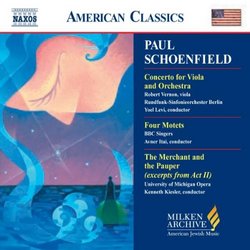| All Artists: Gary Moss, Tyler Oliphant, Paul Schoenfield, Avner Itai, Kenneth Kiesler, Yoel Levi, Pei Yi Wang, Berlin Radio Symphony Orchestra, University of Michigan Opera Orchestra, Jennifer Larson, Christopher Meerdink Title: Paul Schoenfield: Concerto for Viola & Orchestra; Four Motets; The Merchant and the Pauper (Excerpts from Act 2) (Milken Archive of American Jewish Music) Members Wishing: 1 Total Copies: 0 Label: Milken Archive Release Date: 8/17/2004 Genre: Classical Styles: Opera & Classical Vocal, Chamber Music, Forms & Genres, Concertos, Historical Periods, Classical (c.1770-1830) Number of Discs: 1 SwapaCD Credits: 1 UPC: 636943941829 |
Search - Gary Moss, Tyler Oliphant, Paul Schoenfield :: Paul Schoenfield: Concerto for Viola & Orchestra; Four Motets; The Merchant and the Pauper (Excerpts from Act 2) (Milken Archive of American Jewish Music)
 | Gary Moss, Tyler Oliphant, Paul Schoenfield Paul Schoenfield: Concerto for Viola & Orchestra; Four Motets; The Merchant and the Pauper (Excerpts from Act 2) (Milken Archive of American Jewish Music) Genre: Classical
Born in Detroit in 1947, Paul Schoenfield studied in America but lived in Israel for so many years that he regards it as his second home. His music is truly eclectic, merging art with folk elements and classical Western fo... more » |
Larger Image |
CD Details
Synopsis
Amazon.com
Born in Detroit in 1947, Paul Schoenfield studied in America but lived in Israel for so many years that he regards it as his second home. His music is truly eclectic, merging art with folk elements and classical Western forms with Israeli and Eastern European Jewish folk-styles. He says he does not consider himself a composer of serious "art music," but the works on this disc, all written on commission and never recorded before, are certainly serious. The Viola Concerto, composed mostly in Israel in a house adjoining a kindergarten, is based on liturgical melodies and play-songs that he heard the children sing. Using all of the instrument's technical and tonal resources, the lyrical first movement opens with a Hassidic tune that is developed and combined with other, strongly contrasting material; the second is a sustained, mournful, devout meditation; the third is a wild, ecstatic dance depicting King David dancing before the Ark. Robert Vernon, the work's dedicatee, gives an admirable, committed performance; only the very virtuosic Finale sounds a bit labored. An old school friend of Schoenfield's, he is principal violist of the Cleveland Orchestra, who commissioned and premiered the Concerto with him in 1998. The Four Motets of 1995 for a capella choir are very beautiful; influenced by the 16th-century Italian Jewish composer Salomone Rossi, they evoke Renaissance polyphony, harmony and texture. Sung in Hebrew, the verses from Psalm 86 plead for God's mindfulness and mercy. The opera's English libretto adapts a fable by Rabbi Nahman of Bratslav (1772-1811), founder of a Hassidic sect and famous storyteller. The three scenes recorded here include mournful arias, passionate, ecstatic love duets, wild contrapuntal choruses; the music is tonal, archaic, liturgical, soaring, and lovely, culminating in a triumphant outburst of joy and an authentic Yiddish song of celebration. The performance by a large cast of soloists, a narrator, chorus, and orchestra is excellent. --Edith Eisler

 Track Listings (10) - Disc #1
Track Listings (10) - Disc #1